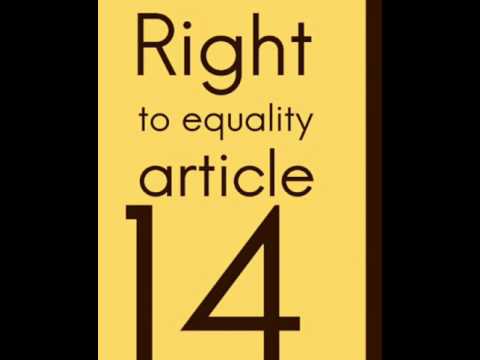Right to Equality:(Article 14 -18)
1.Article – 14
Equality Before Law (Negative Concept)
Equal Protection of Law (Positive Concept)
2. Article – 15 Prohibition of discrimination on the grounds of Religion, Race, Caste, Sex or Place of Birth.
3. Article-16 Guarantees equality of opportunity in matters of public Employment.
4. Article-17 Abolishes Untouchability
5. Article- 18 Abolishes Title
Article-14:
Equality before the law and Equal Protection of Law:
Article-14 embodies the general principles of equality before law and it prohibits the unreasonable discrimination between persons.
Article-14 declares that the State shall not deny to any person equality before the law or the equal protection of the laws within the territory of India.
Thus Article-14 uses two expressions:
Equality Before the law
Equal Protection of the law
“Equality before the Law” is a negative concept implying that the absence of any special privilege of the individuals.
“Equal Protection of Law” is a positive concept implying that the equality of treatment in equal circumstances.
In Anwar Ali Sarkar
V
State of West Bengal
It was held that the 2 expressions mean the same.
Equality Before Law:
It is given in 2 ways, they are
Equality before law and absolute equality
Equality before law and Rule of Law
Equality before law and Absolute Equality:
It is a concept implying the absence of any special privilege of any individual and also the equal subject of all the individuals and the classes to the ordinary law of the land.
Equality before law and Rule of Law:
It means that no man is above the law and every person whatever may be his rank, is subject to the jurisdiction of ordinary courts.
Equal Protection of Law:
This principle is taken from the 14th amendment of the American Constitution.
Equal law should be applied to all in the same situation and there should be no discrimination between one another.
Thus the rule is that,
“Like should be treated as alike and not that unlike should be treated as alike”
Article – 14 permits the classifications but prohibits the class legislations:
It does not mean that the same laws should apply to all persons.
In fact, identical treatment in unequal circumstances would amount to inequality. So, a reasonable classification is necessary to progress for the society.
Reasonable Classification:
Article – 14 does not forbids the reasonable classification.
The classification must not be arbitrary, artificial or evasive but must be based on some real and substantial distinction bearing a just and reasonable relation to the object sought to be achieved by the legislature.
Classification to be reasonable must fulfill the following conditions:
The classification must be founded on an intelligible differentia which distinguishes persons or things that are grouped together from others left out of the group.
The differentia must have a rational relation to the object that is to be achieved by the act.
In DS Nakara
V
Union of India
The Supreme Court struck down Rule-34 of the Central Services (Pension) Rules 1972, as unconstitutional on the grounds that the classification made between pensioners retiring before a particular date and the retiring after that date, was not based on any rational principle and was the violation of Article-14 of the constitution.
In Air India
V
Nargesh Meerza
The Air India and the Indian Airlines Regulation was challenged as a violation of Article-14.
The regulation provided that the Air- Hostess was to retire from the service upon attaining the age of 35years or marriage or on her first pregnancy, which ever occurred earlier.
The Supreme Court struck down the Air India and Indian Airline Regulations as unconstitutional, void and is violating Article-14.

Comments
Post a Comment